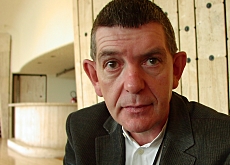
NGOs sound alarm over information summit

Preparatory talks in Geneva ahead of November's World Summit on the Information Society (WSIS) have ended amid controversy, NGOs tell swissinfo.
Wolf Ludwig, a spokesman for Swiss non-governmental organisations, says participants from civil society have been sidelined, and are considering a boycott of the UN-sponsored event, which is to take place in Tunisia.
In comparison with other UN conferences, the WSIS was to have been more innovative in its approach, enabling NGOs to work closely with governments.
But recent moves to exclude members of civil society and the private sector from drafting summit documents have dampened hopes.
Ludwig, a member of the NGO coalition, the “Swiss platform for the information society”, says the Tunisian government, led by president, Zine El Abidine Ben Ali, is largely to blame.
swissinfo: What was the mood like during this third preparatory conference?
Wolf Ludwig: It was much worse than the two previous meetings. There was an omnipresence of organisations that are officially non-governmental, but in reality are unquestioningly loyal to the government of Ben Ali.
Their large presence is a taste of what we can expect at the Tunis summit in November. It’s very disquieting.
swissinfo: How did these organisations behave?
W.L.: The international civil society was divided during the first phase of the WSIS into groups and committees according to topics, in order to share the workload and create a network of specialists.
The aim was to make the other summit participants, such as the states and international organisations, aware of the opinions and demands of civil society.
This was – from the NGOs’ point of view of – one of the best experiences during the first phase of the WSIS summit [in Geneva]. We obtained very good results.
We have noted that the work of certain committees such as those involved in media or human rights issues has been paralysed by associations close to the Tunisian government. This means that it is no longer possible to discuss sensitive topics.
As a consequence, a majority of the representatives of civil society are withdrawing from their respective committees. We are attempting to set up new informal and confidential structures, since we have no confidence in the organisations close to the Tunisian government.
swissinfo: How were they able to block your work?
W.L.: Take for example the group on the media. At the beginning, there were a few dozen people working on the committee. The discussions were controversial but constructive.
But recently, there have been no more than four or five participants who were there from the start, and about 20 representatives from groups close to the Tunisian regime. Since they have been in the majority, they have succeeded in pushing aside the most significant issues.
However, we would like to be able to table the issue of human rights in Tunisia, the host country.
swissinfo: Has this turn of events prompted a response from any European governments?
W.L.: First reactions were rather timid. But over the past few days, there have been several incidents which blocked civil society representatives from participating. Several government delegations have taken note of this in order to discuss the problem formally at the state level.
swissinfo: Has the Swiss delegation expressed its willingness to act in regard to civil liberties?
W.L.: The Swiss delegation has shown that it is sensitive to our concerns. On Wednesday, it received representatives of Tunisia’s civil society – who are truly independent of the government – and a person from the Tunisian foreign ministry responsible for human rights.
Switzerland should, together with other governments, discuss possible measures.
swissinfo: How will the international civil society create an opening for itself during the Tunis summit?
W.L.: It’s first important to note that the situation in Tunisia is not improving, but on the contrary, communica-ch, the Swiss NGO coalition, has found during two visits to the country that activities of Tunisia’s independent civil society have become almost impossible.
It seems to us though that Tunisia has a particular responsibility as the host state and organiser of the 2nd phase of the WSIS, and with regard to the international community, the UN and the international civil society.
But there are no indications that Tunisia is ready to assume its responsibilities.
This is why a majority of representatives of civil society involved in the WSIS decided to send a letter to the UN secretary-general, Kofi Annan.
It states clearly that conditions for a fruitful summit have not been met and without substantial improvement before November 16 [summit start], the international civil society will reconsider its participation.
We are therefore considering organising a counter summit parallel to the official conference. It should demonstrate that NGOs are not willing to be passive observers.
That said, we are well aware that the Tunisian government will do everything in its power to block such an initiative. But this will once again show the unwillingness of the government of Ben Ali.
swissinfo-interview: Frédéric Burnand in Geneva
The UN decided to hold a World Summit on the Information Society in two phases.
The first was held in Geneva two years ago, and concluded with the adoption of a declaration of principles and a plan of action.
The second, taking place in Tunis from November 16-18, will attempt to put the plan of action in motion and reach agreements on internet governance and financing mechanisms.
Founded in 2002, communica-ch counts around 20 NGOs as members, and has a vast network of supporters.
It is the only Swiss coalition active in this field.

In compliance with the JTI standards
More: SWI swissinfo.ch certified by the Journalism Trust Initiative





























You can find an overview of ongoing debates with our journalists here . Please join us!
If you want to start a conversation about a topic raised in this article or want to report factual errors, email us at english@swissinfo.ch.